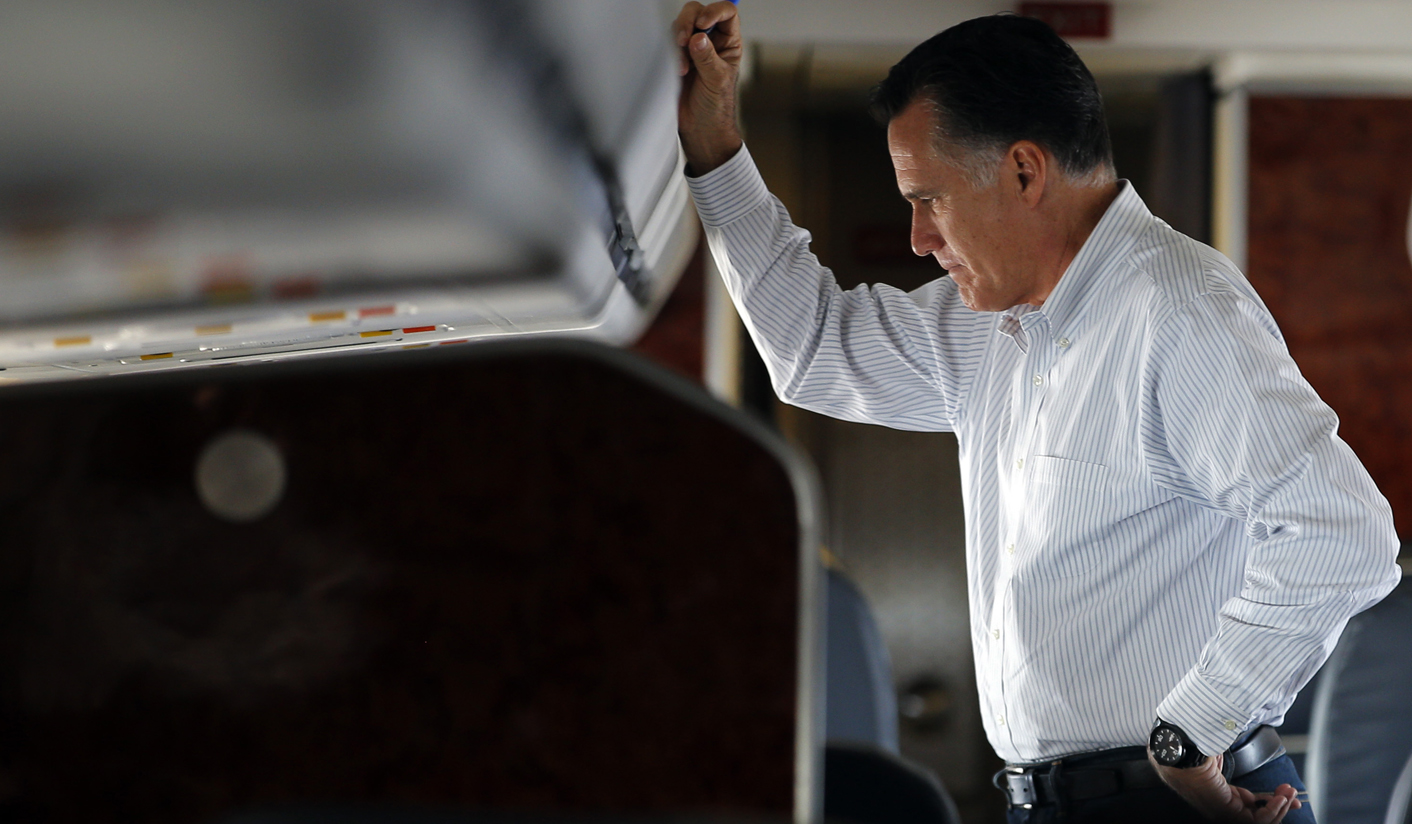The past two weeks have not been particularly kind to Mitt Romney, Republican candidate for the American presidency. This was the man who seemed, at first, to be the preternaturally CEO-esque presidential option, relying upon spread sheets and authoritative corporate case studies to make crisp rational decisions based on best practice and sound management techniques.
But Mitt Romney’s probation period – essentially his campaign for president – now seems increasingly fraught with difficulties that will be increasingly impossible for him to address, let alone rectify, in the remaining six weeks of the campaign.
The criticisms of the Romney campaign range from the tactical and strategic to the existential, and they are no longer the product of Democratic partisans. These are almost always the sign of a campaign in deep – and growing – trouble. And they are coming along at precisely the time when the demographic challenges to the Republican campaign’s effort to unseat incumbent President Barack Obama will make it increasingly tough for Romney to cross the finish line first.
The most obvious and ominous straw in this metaphorical wind has been the decision by former Minnesota Governor Tim Pawlenty, one of Mitt Romney’s key surrogates (a candidate cannot be everywhere and speak to everybody in every audience in a country of 300 million-plus people) to throw in the towel and take, instead, a richly remunerated position as the head of the Financial Services Roundtable, one of the most powerful lobbying groups in Washington.
Pawlenty’s defection, less than two months before the election, was a signal that in the mind of senior politicians Romney’s presidential cause is evaporating rapidly in the home stretch – to mix those metaphors. Pawlenty, after all, is not just any old pol – he was a leading candidate to be Romney’s running mate. And he was even a potential presidential candidate himself before it became apparent early on that he had even less of a presidential temperament than Romney.
Then there has been the ongoing public flogging of Romney and his campaign by Republican intellectual stalwarts Peggy Noonan, Michael Gerson and David Brooks. The three are important figures of the moderate right in American politics and political thought. Noonan is, after all, the woman who helped shape the words for so many of Ronald Reagan’s greatest oratorical triumphs. Gerson was George W Bush’s special White House representative to the evangelical-fundamentalist-Christian community, one of his speech writers and the man who probably did more than almost anybody else to bring PEPFAR’s campaign against HIV/AIDS to life as an living example of Republican values supporting public-private partnerships in international affairs. Brooks has been The New York Times’ house conservative columnist and a leading voice for mainline, establishment Republican ideas for many years.
That each of these individuals has come to the place where they will publicly chastise Mitt Romney’s campaign (violating Ronald Reagan’s first commandment about not speaking ill of fellow Republicans) and his ideas undoubtedly sends a serious message to others about the wrongheadedness or futility of Romney’s challenge.
Noonan’s blistering critique appeared in The Wall Street Journal and portrayed a potent mix of tactical, strategic and even metaphysical failures that may doom a Romney candidacy. In it, she argued, a candidate can’t be both the party’s nominee and the CEO of his campaign.
“The candidate is out there every day standing for things, fighting for a hearing, trying to get the American people to listen, agree and follow,” she wrote. “That’s where his energies go. On top of that, if he's serious, he has to put in place a guiding philosophy that somehow everyone on the plane picks up and internalizes. The candidate cannot oversee strategy, statements, speechwriting, ads. He shouldn't be debating what statistic to put on slide four of the PowerPoint presentation. He has to learn to trust others—many others.”
Meanwhile, in views he underscored over the weekend on TV news discussions, Brooks wrote that Romney, who said 47% of Americans “are dependent upon government, who believe they are victims, who believe the government has a responsibility to take care of them, who believe they are entitled to health care, to food, to housing, to you name it,” was woefully out of touch with the country he wants to lead.
“It suggests,” he wrote, “that Romney doesn’t know much about the culture of America. Yes, the entitlement state has expanded, but America remains one of the hardest-working nations on earth. Americans work longer hours than just about anyone else. Americans believe in work more than almost any other people. Ninety-two percent say that hard work is the key to success, according to a 2009 Pew Research Survey.” Brooks summed up by suggesting that Romney was a nice enough fellow who “says stupid things because he is pretending to be something he is not — some sort of cartoonish government-hater. But it scarcely matters. He’s running a depressingly inept presidential campaign. Mr Romney, your entitlement reform ideas are essential, but when will the incompetence stop?”
Rounding out this hat-trick, Gerson threw in his lot on philosophical grounds, arguing the secretly taped record of Romney’s comments at a Florida fundraiser “confirmed an existing stereotype of Romney and Republicans as wealthy white businessmen, clinking wine glasses while bemoaning the irresponsibility of the help. This probably does not change the fundamental dynamic of the race, because few imagined Romney to be a closet populist. The problem for Romney is that the fundamental dynamic is not favourable. A nation disillusioned with the incumbent has unresolved questions about the suitability of the challenger. The video holds those questions open at a time when Romney should be answering them.”
Taken together, these criticisms by word and deed are the weakening trill of the canary in the coalmine of Republican chances of a presidential win in 2012. But they also acknowledge that demographics are flowing away from Romney as well, magnifying the effect of the missteps, miscues and intellectual confusions his Republican critics have levelled at him.
To point is that winning the election does not hinge precisely on winning the largest number of votes. Rather, it is a simultaneous collection of 50 different elections, one in each state. Generally (with a few exceptions), if a candidate wins the race in a state, that candidate wins the total electoral vote of that state, even if a candidate wins the particular state election by only a few hundred votes.
Since the electoral votes more or less represent the apportioning of the population weight of each state, the election is a contest of gaining 270 out of a total of 538 electoral votes. Many larger states, mostly on the East and West Coasts, plus Illinois, have been trending Democratic for a long time. They’ve been counterbalanced by smaller southern and Midwestern states (plus Texas), which lean Republican.
There is also a key group of states –Virginia, Ohio, Florida, Colorado, Arizona, Wisconsin, Iowa, New Hampshire – where the division between the two parties is much more evenly divided, hence their label of battleground or swing states. But recent polling is showing that Obama is doing much better than expected in two of the larger of those states, Ohio and Virginia, and he may also be gaining traction in Florida. Given the electoral weight of these three, wins there by Obama effectively will mean Romney will lose the election.
It all seems to be coming down to the 5% or 6% of the voting population in those battleground states who maintain to pollsters that they are still undecided about their choice for 6 November. Put another way, about 150,000 voters hold the election in their indecisive, wavering, ballot-filling-in-hands. For both Romney and Obama, it is coming down to mobilising their supporters to make sure they are registered to vote – and that they actually show up on 6 November to make their vote count.
Ah, but there are other wildcards in the game. First is the phenomenon of advance voting. Advance voting has moved from being the traditional absentee ballot for voters who can prove they will be in hospital or out of the country on Election Day to being a mechanism whereby citizens in a growing number of states routinely register for their ballot and are allowed to submit it by mail (or even in some cases via the Internet) at any point after 1 October (the ballots are not counted until Election Day). What this means in practice is that campaigns can organize to ensure their supporters vote as soon as convenient and that their participation as voters can be monitored and aided over an entire month-long period rather than only on one day.
Another issue that may potentially affect the outcome are laws passed by several states to make voter registration and voting more carefully monitored so as to lessen the possibility of voter fraud – or, as some have charged, to restrict minority, less educated or poorer citizens from becoming voters in the first place.
The fate of the election hangs on these wildcards, the weather on Election Day (bad weather has historically tended to hold down participation of Democrats) and the effect of the three presidential candidate debates, beginning on 3 October. For this reason, the Romney camp is placing enormous stress on their candidate’s increasingly intense debate prep, sensing they will be decisive for his chances. Meanwhile, the Obama camp is vigorously trying to dampen expectations of a blowout by their candidate in the debates – saying things such as the fact that Romney is an extremely dangerous debater with some 20 debates under his belt already this year.
Of course he had to fend off the likes of Michele Bachmann, Herman Cain, Newt Gingrich and Rick Perry, so who really knows. But we’ll find out in two weeks’ time whether Romney’s last big bet on the debates can pay off. DM
Read more:
- “Why Obama is pulling ahead in the battleground state of Wisconsin,” on the Christian Science Monitor;
- “Mitt Romney's alter ego,” on Politico;
- “US election 2012 - States of play,” on the Economist;
- “Vote early: Skip the lines, maybe the debates, too,” on the AP.
Photo: Republican presidential candidate and former Massachusetts Governor Mitt Romney talks to an aide on his campaign plane while en-route to Las Vegas, Nevada September 21, 2012. REUTERS/Brian Snyder





